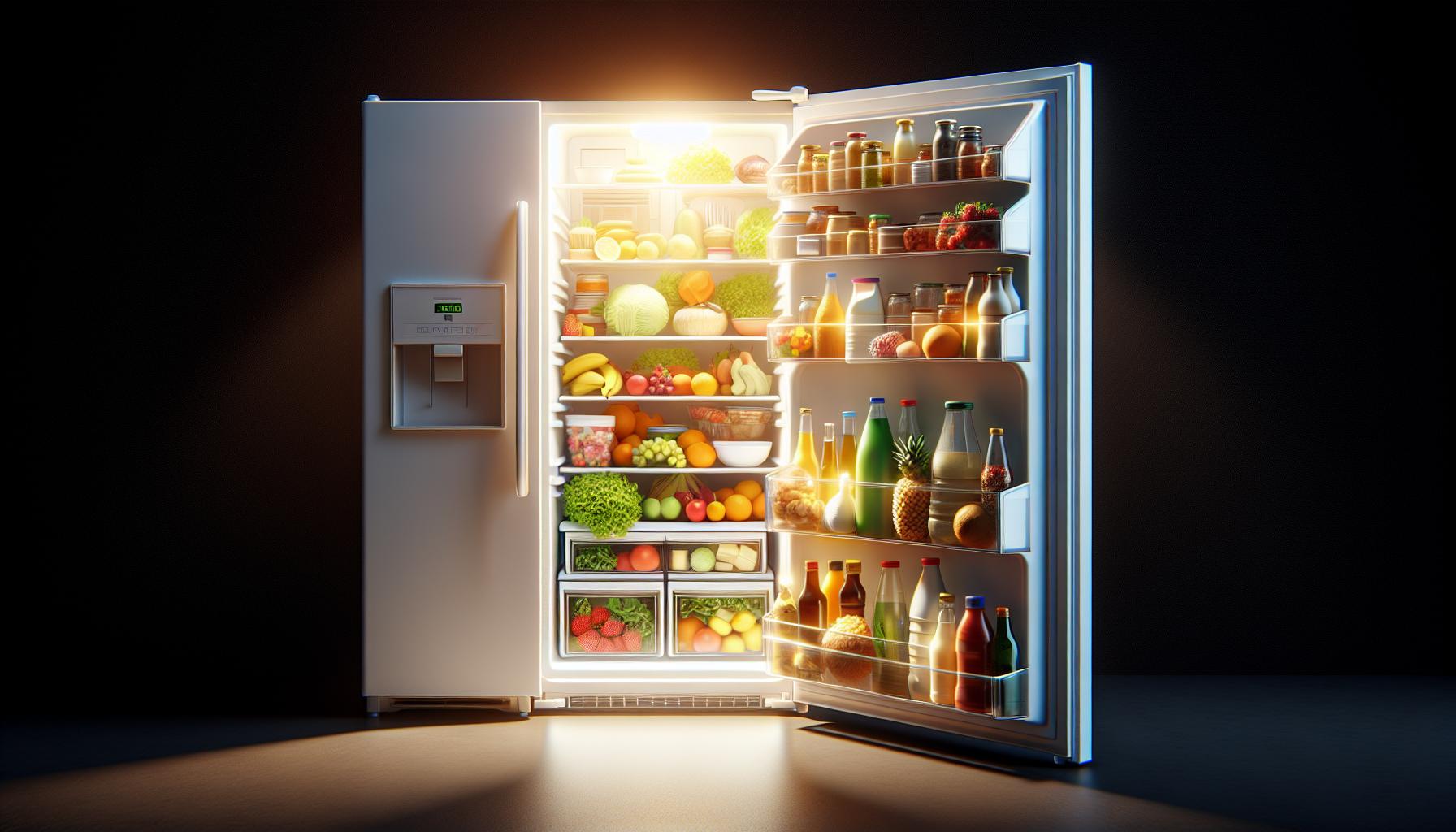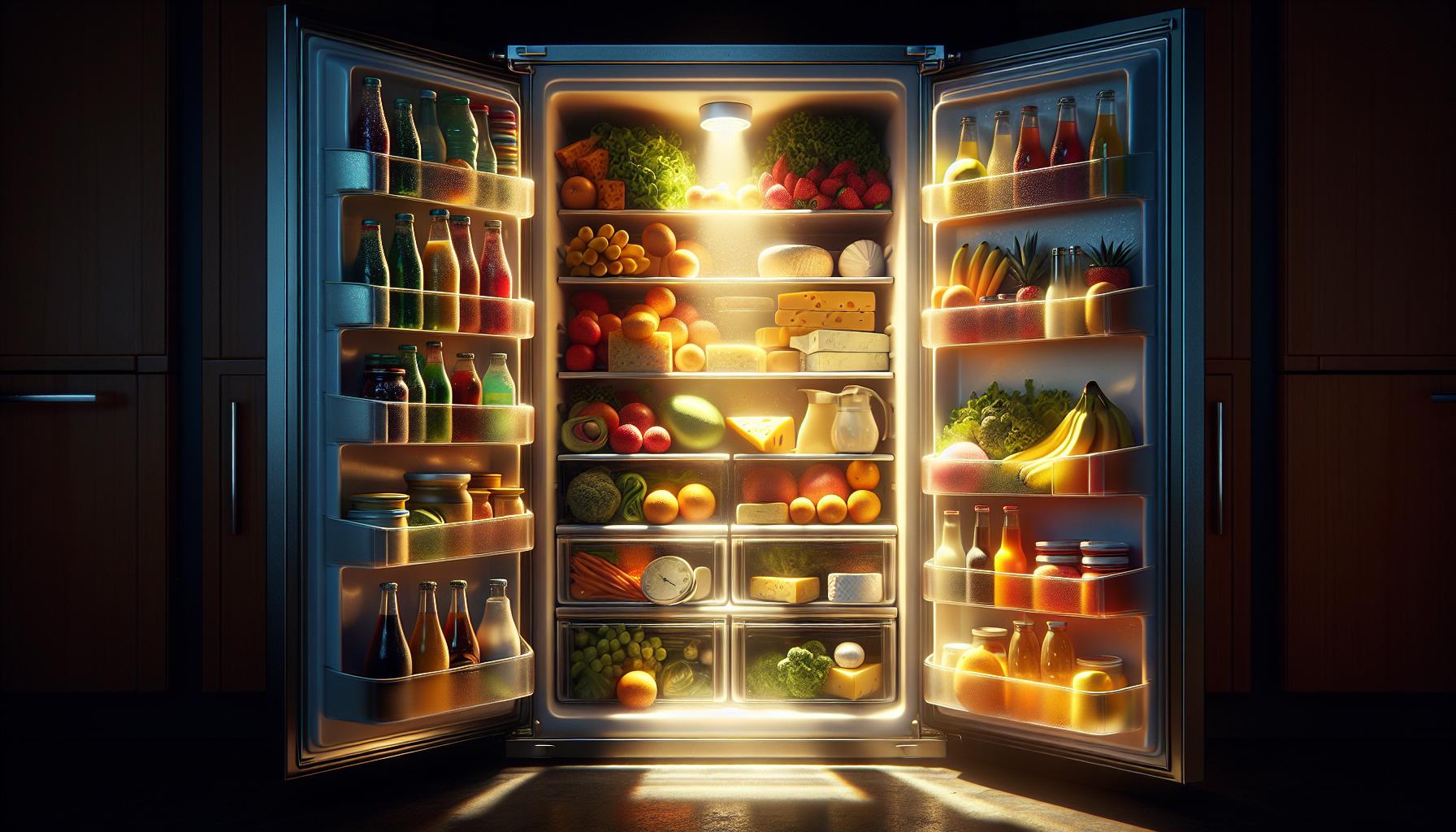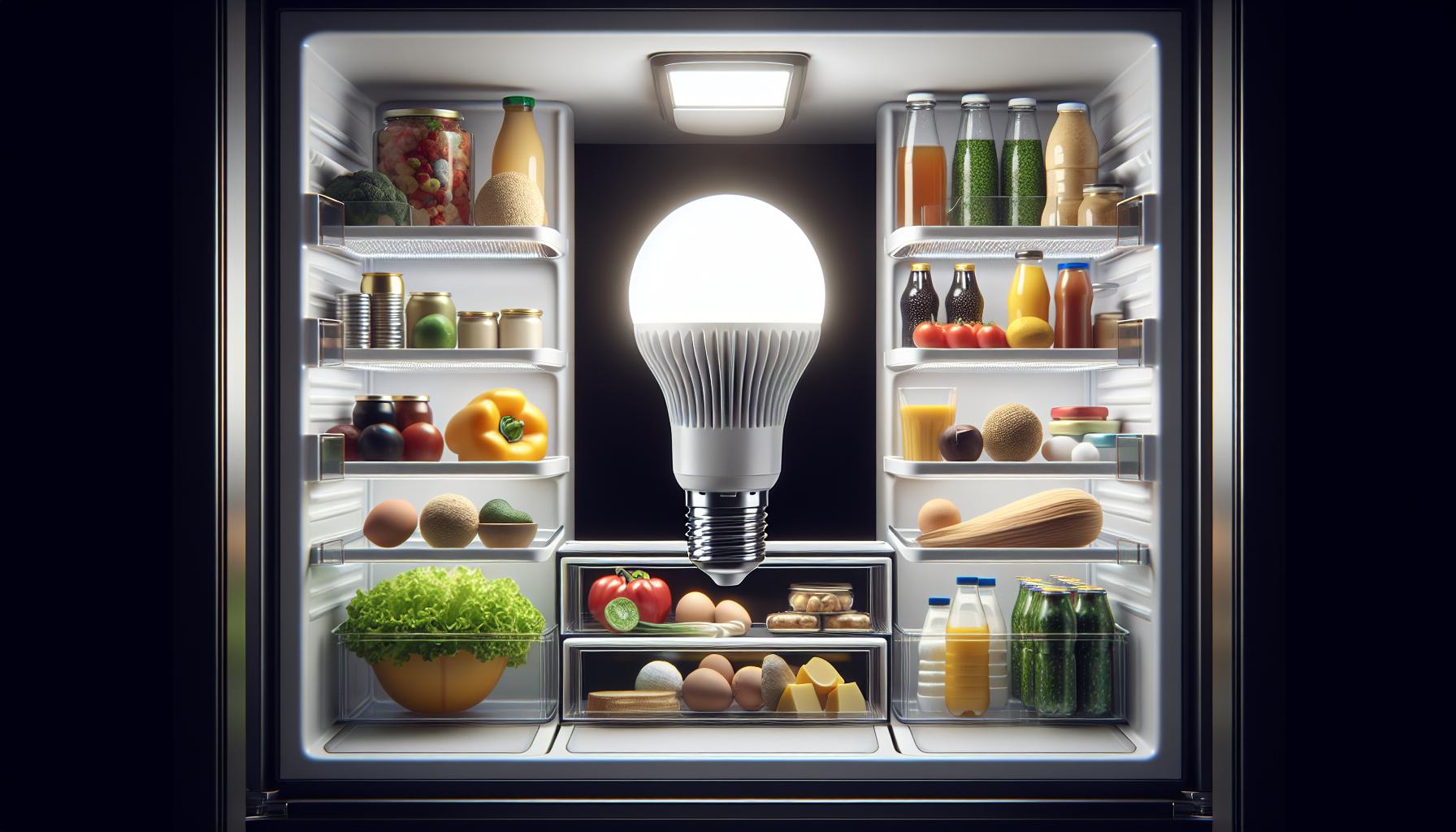Ever wondered how long the little light that greets you when you reach for a midnight snack lasts? You’re not alone. Refrigerator light bulbs are one of those things you rarely think about—until they flicker out. Luckily, they’re built to last longer than you might expect.

But just how many times can you grab a yogurt or check for leftovers before that bulb dims for good? It’s a simple question, yet the answer might surprise you. Let’s shed some light on the lifespan of those hardworking fridge bulbs and what affects their longevity.
Knowing the ins and outs of your fridge’s illumination isn’t just trivia; it can save you from future fumbles in the dark. So, let’s dive into the bright world of refrigerator light bulbs and keep you enlightened on what to expect.
Understanding refrigerator light bulbs
As a savvy DIY enthusiast and light aficionado, you know that delving into the specifics of refrigerator light bulbs is essential. Grasping their intricacies helps ensure your fridge isn’t left in the dark unexpectedly.
Refrigerator light bulbs differ from standard bulbs, designed to withstand low temperatures and moisture. They’re often smaller and have a sturdy build to handle the frequent door openings that can cause vibrations. This rugged design contributes to their longevity and reliable performance.
There are mainly two types of bulbs that you may find in refrigerators:
- Incandescent bulbs: These are the traditional light bulbs that have been used for decades. They’re known for their warm light but are not as energy-efficient as their modern counterparts.
- LED bulbs: These have gained popularity due to their energy efficiency and longer life span. An LED bulb in your fridge not only lasts longer but also operates cooler, reducing the energy needed to maintain internal temperatures.
The wattage of these bulbs typically ranges from 15 to 40 watts, but with the advent of LEDs, equivalent illumination can be achieved with much lower energy consumption.
To maintain optimal performance, it’s crucial to select the right bulb for your refrigerator model. Deviating from the manufacturer’s recommendation can lead to poor illumination or even damage to your appliance’s electrical system. Always check the user manual or manufacturer’s website for the correct bulb type and wattage.
Furthermore, proper maintenance can extend the life of your refrigerator light bulb. This includes cleaning the bulb and its fixture to prevent the buildup of grime, which can lead to overheating and shorten the bulb’s lifespan.
Remember, even with the best care, light bulbs are wear-and-tear items that will eventually need replacement. By understanding the various elements that contribute to their longevity, you’ll be better prepared to keep your refrigerator light functioning brilliantly.
Factors that affect the lifespan of refrigerator light bulbs

When you’re navigating the maze of choosing the right light bulb for your fridge, you’re likely wondering just how long you can expect your new bulb to last. Bulb lifespan can vary considerably and several factors play a pivotal role in determining just how many times your refrigerator’s light will flip on before it’s time for a replacement.
Frequent Door Openings stand out as a primary culprit in shortening bulb life. Every time you open the fridge door, you’re not just grabbing a snack; you’re triggering the light switch. This constant on-off cycle can wear down your bulb faster than you’d think.
Temperature fluctuations also take their toll. While refrigerator lights are built to handle the cold, the repeated move from cold to ambient room temperature when the door is held open can stress the bulb, potentially causing it to fizzle out prematurely.
Next up, consider the type of bulb. LED bulbs have a reputation for longevity, often outshining their incandescent counterparts. However, even the sturdiest LED can meet an untimely end if it’s not specifically designed for the unique environment of a refrigerator.
« Why Do Light Bulbs Pop? Uncover the Surprising Reasons and Fixes
How to Make Light Bulbs Less Bright: Soften Any Room’s Glow »
Power Surges are another hidden enemy, lying in wait to cut your bulb’s life short. While rare, an unexpected surge can spell instant doom for the delicate components within your glow-giver.
And let’s not forget Usage Habits. Your fridge’s lighting doesn’t only depend on the make and model of the bulb. It’s also how you, the user, interact with it. Slamming the fridge door, for instance, can send a shockwave that shortens a bulb’s life span.
So, as you’re stocking up your fridge or delving into a late-night snack, keep these factors in mind. A thoughtful approach to how you use your refrigerator can add hours, days, or even years to your light bulb’s service time. Your efforts to mitigate wear-and-tear could mean a brighter interior for your midnight munchies without the unexpected inconvenience of a dark fridge.
How long do refrigerator light bulbs usually last?

When you’re tackling home DIY projects, there’s something incredibly satisfying about finding that sweet spot for maintenance where everything just hums along nicely. Your refrigerator light bulb is a small but mighty component of that satisfaction. Generally speaking, the lifespan of a refrigerator light bulb typically ranges between 1,000 to 2,000 hours. However, this time can vary significantly depending on several factors you control.
Firstly, let’s talk about usage. Each time you open your fridge door, a little welcoming beam shines out. Now, if you’re someone who likes to stand with the door open, pondering what you’re in the mood for, you’re chalking up minutes on your bulb’s lifespan. Consider your habits. Are you a frequent fridge raider? Or do you plan and retrieve what you need swiftly?
The type of bulb is another key player in this game of longevity. While traditional bulbs like incandescents are on their way out, they’re still kicking around in some older models. These could knock off a bit sooner than their modern counterparts. Nowadays, manufacturers mostly install LED bulbs, which are champions of endurance and operate effortlessly even in the cold climate of your fridge.
Remember those power surges that sometimes flicker your lights? They don’t just spook you; they jolt your refrigerator bulb, too. A good surge protector might be a worthy investment to shield that little light from unexpected spikes.
To give you an at-a-glance look at lifespan estimates by bulb type, here’s a neat little table:
| Bulb Type | Estimated Lifespan (hours) |
|---|---|
| Incandescent | 1,000 |
| LED | Up to 2,000 |
It’s striking how the details of your interactions with your refrigerator and technology choices can stretch or shrink the time between those light bulb changing moments. While the technical specifications provide a benchmark, it’s wisdom and personal usage patterns that truly dictate the duration your fridge light keeps glowing.
Signs that your refrigerator light bulb needs to be replaced
When you frequently plunge your hand into the fridge and come out with something other than you intended, it’s a sign that your bulb might be failing.
Observed Dimming typically tops the list. A fridge bulb that’s growing dimmer than your grandmother’s antique lamp is crying for help. Unlike the gradual sunset, a refrigerator light bulb’s dimming is due to wear and not a picturesque sky.
Next up, Flickering. If it’s more like a strobe light at a disco than the steady glow you’re used to, it’s time for a change. No, your refrigerator isn’t trying to start a party. It’s your cue that the filament inside the bulb is struggling to maintain a consistent current.
Then there’s Inconsistency: when your fridge light picks and chooses when it wants to work. You might open the door at midnight for a snack, and it’s as bright as Times Square, but in the morning, it’s more like a cavern. This erratic behavior isn’t a result of your fridge being moody. It’s a worn-out light bulb.
Finally, pay attention to Noise or Odd Sounds. Hear a hum, buzz, or high-pitched whine? That’s your light bulb’s swan song. Just like a buzzing bee signals its presence, these noises flag that the end is near for your bulb.
While these signs may seem minor, they’re hints that it’s time for a bulb audit. Ignoring them can lead to a full burnout, leaving you in the dark—or worse, causing damage to your refrigerator’s electrical components.
Be proactive. When you see these signs, swap out your bulb to keep your late-night snacks illuminated and your fridge in tiptop shape. Consider upgrading to an LED bulb for longer life and better energy efficiency. Remember, the right light ensures your food is in the spotlight, just where you want it.
Tips for extending the lifespan of your refrigerator light bulbs

As someone who’s tackled their fair share of DIY projects and has a penchant for perfect lighting, you know that the little things can make all the difference. When it comes to your refrigerator light bulb, longevity is key. Regular Maintenance can go a long way. Make sure you periodically clean the bulb with a soft, dry cloth to remove any dust or grime. And don’t forget to gently wipe the socket and surrounding area; a clean environment helps prevent overheating.
Speaking of overheating, Proper Ventilation within your fridge can extend the life of the bulb. Avoid overpacking as this hinders airflow and causes the bulb to work harder, potentially shortening its lifespan. Always arrange your items in a way that allows for air to circulate freely. Plus, this helps your fridge operate more efficiently—saving energy and keeping your food fresh.
It might seem unconventional, but thinking about Usage Habits can also make a difference. Minimize the number of times you open the fridge door, as every opening invokes a cycle of on and off that accumulates wear on the bulb. Planning ahead and knowing what you need before you open the door can reduce the strain on your bulb.
Quality Bulbs matter more than you might think. While it can be tempting to go for a cheaper option, investing in a high-quality bulb, notably an LED one, typically offers a longer lifespan. LEDs not only offer durability but also withstand frequent on-off cycles much better than their incandescent counterparts.
Lastly, remember to check the Bulb’s Wattage. Using a bulb with the correct wattage for your refrigerator model is crucial. A higher wattage than recommended can lead to excess heat generation, further risking premature failure of the bulb. Always stick to manufacturer specifications for the best results.
By incorporating these simple yet effective practices into your routine, you’ll find your refrigerator light bulb standing the test of time, ensuring your midnight snacks are always well illuminated. With these tips, you’re not just extending the life of a bulb, you’re honing the craft of careful appliance maintenance.
Conclusion
So there you have it! You’re now equipped with the know-how to keep your fridge’s light bulb shining bright for as long as possible. Remember, a little maintenance goes a long way, and choosing the right bulb makes all the difference. Stick to these simple habits and you won’t be left in the dark when reaching for your favorite midnight snack. Happy fridge-lighting!
Frequently Asked Questions
How can I extend the lifespan of my refrigerator light bulb?
Regular maintenance, including cleaning the light bulb and surrounding area, is essential to prevent overheating and extend the light bulb’s lifespan.
Why is proper ventilation important for refrigerator light bulbs?
Proper ventilation helps prevent the bulb from working harder than necessary due to hindered airflow, which can occur if the fridge is overpacked.
Does opening the fridge door frequently affect the light bulb’s lifespan?
Yes, minimizing the frequency of opening the fridge door can reduce wear on the bulb and help prolong its lifespan.
Are LED bulbs a better option for refrigerators?
Investing in high-quality LED bulbs is beneficial for a longer lifespan compared to traditional bulbs due to their efficiency and durability.
Is it important to use a bulb with the correct wattage in my refrigerator?
Using a bulb with the correct wattage is crucial as it prevents excess heat generation that could reduce the bulb’s lifespan.




